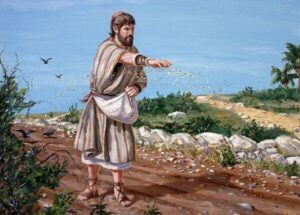Jesus’ Parable of the Seeds and Soils
Jesus was the master teacher, and as such, he used stories to illustrate his teachings. One of his most familiar is the parable of the seeds and soils. For many of Jesus’ parables, his explanation is not recorded. But he explained this one privately to his disciples. But even with Jesus’ explanation, there have been various interpretations. So, how should we interpret and apply this most important story?
Context of the seeds and soils parable
Most important in interpreting any parable is the context in which it was told. What was the topic of discussion? What was Jesus doing or saying?
The context of this parable was that Jesus had that at that time embarked on a preaching tour around the countryside:
…. Jesus traveled about from one town and village to another, proclaiming the good news of the kingdom of God…. While a large crowd was gathering and people were coming to Jesus from town after town, he told this parable… (Luke 8:1, 4)
Jesus preached the good news of God’s kingdom. The good news was that the preacher himself was the promised Messiah—the king of God’s kingdom— and he had finally come. Those who enter God’s kingdom are those who submit themselves to God’s rule by believing, trusting, and following Messiah Jesus.
And now the results of his preaching in the various towns were about to be illustrated in a story.
The parable
The story is simple:
“A farmer went out to sow his seed. As he was scattering the seed, some fell along the path; it was trampled on, and the birds ate it up. Some fell on rocky ground, and when it came up, the plants withered because they had no moisture. Other seed fell among thorns, which grew up with it and choked the plants. Still other seed fell on good soil. It came up and yielded a crop, a hundred times more than was sown.” When he said this, he called out, “Whoever has ears to hear, let them hear.” (Luke 8:5-8)
“Ears to hear” is Jesus’ metaphor for an open heart and desire to learn. This oft repeated ending to many of his parables was a call to any and all who want to know the truth. It wasn’t intended to exclude anyone but was an invitation to those who lack understanding but are still seeking.
Interpreting parables
Parables and allegories can be very useful in illustrating spiritual truths, and Jesus used them frequently. But we should be careful in trying to establish doctrine from these simple stories. Remember that Jesus’ stories usually had simple and understandable lessons. His goal was to teach principles but not commands or complex theological systems.
It’s also important that we don’t assume that similar metaphors always have the same meaning. For example, Jesus’ parable of the weeds (Matthew 13:24-29) also used a sower as a metaphor, but the meaning may be different than in the seeds and soils.
The details in parables add interest to the stories but rarely have significant meaning. To properly interpret a parable, we need to identify the main theme but de-emphasize the minor elements. If taken too far, any parable or allegory becomes absurd.
The main focus
In the parable of the seeds and soils, the farmer is not the focus of the story—neither his motives, his skill, his character, nor his method of sowing seed. People who speculate about these can divert from Jesus’ main message and go off into uncharted territory.
So, what are the significant parts of the story? Obviously, the various responses that the seed had in the different soils.

Jesus’ explanation
In his explanation of the parable, Jesus tells us what the seed represents:
This is the meaning of the parable: The seed is the word of God. (Luke 8:11)
The seed is God’s Word. In this context, it’s the good news of the kingdom of God that Jesus had just been preaching in the countryside. The gospel is the catalyst for the kingdom of God. It’s what makes everything happen, what gets things started.
Most importantly, Jesus is describing a process of the kingdom of God. Here, the “word of God” is the unchanging and incorruptible seed of the gospel. The farmer just does his job, which is to sow the seed of the gospel, but the gospel is what actually germinates, grows, and bears fruit. And the results depend on the condition of the hearts of the people who hear it.
The seed on the path
Jesus’ explanation of the seed that fell on the path seems very straightforward:
Those along the path are the ones who hear, and then the devil comes and takes away the word from their hearts, so that they may not believe and be saved. (Verse 12)
Those who didn’t respond at all were deceived by the devil, who stole God’s Word from their hearts. They saw no value in it and had no interest in it. To them it was like a worthless item, something even to be mocked. In this case the seed didn’t even germinate and there was no growth, no fruit, and no salvation. The devil took it all. The problem here is not with the seed, but with the soil.
The fact that there are many people who meet this description might suggest that this is a very bad farmer. But again, the farmer is not our focus.
The seed on the rocky soil
Likewise, the seed on the rocky soil seems understandable.
Those on the rocky ground are the ones who receive the word with joy when they hear it, but they have no root. They believe for a while, but in the time of testing they fall away. (verse 13)
The rocky soil allowed germination but not substantial growth. So, the faith of this group was shallow and not substantial. It didn’t allow for true spiritual fruit.
The faith of those of the rocky ground was not a saving faith, but a shallow faith based on convenience. Again, it’s not the gospel seed that’s at fault, but the soil.
It’s entirely possible for a person to hear the gospel, get excited about it, and then lose the excitement without ever coming to a real saving faith. It doesn’t matter if a person has “prayed the sinner’s prayer” or has “gone forward” in an evangelistic service. What matters is trust in Christ to forgive, save, and transform. This requires a personal faith and love relationship with him, not just a mental agreement to the facts of the gospel.
Some see this parable as a support for their belief that Christians can lose their salvation. That this group believed for a while and then fell away seems to prove their case. In their mind when the word believe is used in the Bible, it always means a true biblical faith. But that is not the case here. This parable is not about how to become a Christian. We already know that Christ is the Savior who saves—without trusting him there is no saving. The fact that Jesus doesn’t say this explicitly shouldn’t bother us because he’s describing the results of the spreading of God’s Word, not the content of the gospel itself.
The seed among the thorns
The seed that fell into the thorn bushes germinated but the plants were choked out:
The seed that fell among thorns stands for those who hear, but as they go on their way they are choked by life’s worries, riches and pleasures, and they do not mature. (verse 14)
As anyone who has had a garden knows, your plants can’t flourish if you allow weeds to take over. Even more so if you sow the seeds into a thicket of well-established thorn bushes.
This metaphor illustrates those who hear and then life’s worries and worldly distractions choke their faith and keep them from responding to God. We already know the seed represents God’s Word, so “the seed …. stands for those who hear” doesn’t refer to the people themselves, but the results the seed had on those people.
Disappointing results
Worries and worldly distractions have kept countless people throughout history from coming to true faith. As one who has shared God’s Word with countless people over the years, I have seen this happen much more than I would like. A person hears the gospel and has an initial interest in the message, but the attractions of the world lure them away and they completely lose that interest. It grieves my heart (and the heart of God) to see temporary and shallow pursuits of the world draw people away from the eternal treasure of a life with the Creator.
Were these people in the parable true believers? Again, Jesus was not telling us how to become a Christian or even come into the kingdom. The more important focus of the story is why the seed didn’t grow enough to bear fruit. And in the context of this parable, the point is that this group did not bear the spiritual fruit that is common to all true believers.
The broader application of this parable is that worldly pursuits can compromise anyone’s faith. We all acknowledge that it’s possible for Christians to become distracted by worldly concerns so that their love for God wanes. We all know Christians who have succumbed to that. Maybe you as a reader have fallen into that trap. So, this parable is also a warning to those of us who believe the gospel.
The seed in good soil
As any farmer will tell you, good soil will produce a good crop.
But the seed on good soil stands for those with a noble and good heart, who hear the word, retain it, and by persevering produce a crop. (verse 15)
This is the desired outcome of sowing God’s Word—a crop. To produce an abundant crop, you need healthy plants. And to produce healthy plants, you need good quality soil.
Noble heart
But what does Jesus mean by a “noble and good heart”? Does he mean sinless? No, that’s impossible. Does he mean holy? Not exactly.
Since the soil is the focus of the parable, he’s describing a heart that is like a deep and fertile soil, one that will produce a crop. Seed germinates and the plants grow well in this soil because it’s deep and can sustain growth. A person with a noble heart understands their need for God. And when hear the gospel, they turn to God in repentance and embrace it sincerely and fully. James exhorted us to:
…humbly accept the word planted in you, which can save you. (James 1:21)
David confessed his need for an undivided and pure heart:
Teach me your way, Lord, that I may rely on your faithfulness; give me an undivided heart, that I may fear your name. (Psalm 86:11)
This is a noble heart—one that seeks after God sincerely, acknowledging sin before him and accepting his Word. One who seeks God will desire to be in a right relationship with him and will come to him for all his promised blessings.
Various levels of fruitfulness
In the parable of the seeds and soils, the seed on good soil gave various rates of return: 100, 60, or 30 times what was sown. This means that true believers have different levels of fruitfulness in their faith.
It is an undeniable fact that some Christians are better followers of Jesus and others are not as good. But all true believers in Christ are his servants and will show some level of fruitfulness. If there is no fruit at all, it’s unlikely there is any true faith.
Are there other lessons in this parable?
Are there other lessons we can get from the seeds and the soils? Certainly.
First, if we are tasked with sharing the gospel, then we would be considered a sower. Our job is to just share God’s Word faithfully without changing it or compromising it.
Second, we don’t know who will respond and who won’t: only God knows that. So, Christ’s witnesses are to be indiscriminate as to who to share the gospel with. They are to scatter the seed far and wide. Jesus told his disciples that what they heard him teach, they were to “proclaim from the roofs” (Matthew 10:27) and to the “ends of the earth” (Acts 1:8).
Third, a gospel sower sows the seed but doesn’t make it grow. The power is in the seed itself—not the farmer. The gospel is the “power of God unto salvation” (Romans 1:16). The seed may lie for a long time without germinating, but if the conditions are right it will come to life and bear fruit.
Lastly, we don’t do the saving—that’s Christ’s job, not ours. And we shouldn’t argue or fight with those who hear the message, but just love them, sow the seed, and trust God to do his work.
Can a person’s heart condition change?
A question that comes up in reading the parable of the seeds and soils is whether someone can be of one soil type and then change to become another type. In other words, can a person’s heart change, either for better or worse? Jesus doesn’t answer this question directly in the parable because he is describing groups of people, not individuals.
Warning against hardness of heart
But in the agricultural world, soil quality can deteriorate. It can be compacted or lose moisture or nutrients needed for plant growth. Applying this spiritually, we know that someone’s heart can go from better to worse. The Bible calls this “hardening of the heart.” A person can have interest in the gospel at one point, and then totally lose their interest and even reject it outright. They can be in a favorable spiritual environment, and then later fall into total disdain for God. I pray this is not the case with you. If it is, consider the dreadful final result of your condition and resolve to change.
Turning to God
But on the other hand, we know that poor soil can also be amended to become better soil, suitable for plant growth. Farmers do this all the time. And we know from many Bible passages that a worldly person can repent of their worldliness, an indifferent person can repent of their indifference, and a wicked person can repent of their wickedness. On an individual level, yes, a person can change! So, this parable does not teach that God sets people’s lives in stone, as some theologians like to teach.
We are not locked into a certain destiny by fate. As long as we are alive, God gives us the opportunity to change our heart condition and positively respond to his Word. This is a promise of blessing for those who desire to know God, who “have ears to hear.” If you previously had a hard heart with little desire for God, but now want to know him, take Jesus at his word and embrace the gospel. God will accept you into his kingdom and you will be a part of the “abundant harvest” he so eagerly desires.
Christ in Scripture is listed on Feedspot Top 200 Christian Blogs.







3 thoughts on “Jesus’ Parable of the Seeds and Soils”
This is very timely, given the days in which we live. Sadly, there are many people that allow the fickle winds of social trends to choke out their faith, and remove their focus from Christ. The thorns are always at the ready.
This is a really helpful article on this subject. Some really useful insights, thank you! Do you think, even though it is not the focus of the scripture itself, that we might think about becoming better farmers?
If we prepare the soil to some degree by our conduct or our being salt and light to people that the soil may improve and be more ready to receive the seed of the Gospel? I have found that people are willing to listen and engage if I have built a relationship with them first, or have been a good neighbour etc.
Also, we can improve our farming skills by reading and learning; knowing the scriptures better and reading books about evangelism and books helping us to understand the times we live in and the people of this age.
Perhaps we can have some influence on the quality and the effectiveness of the seed?
Paul,
Thank you for your thoughtful comments. Like you said, although the parable doesn’t focus on the farmer and his methods, there are surely areas that us gospel ministers can improve upon: our witness in both word and deed. And the gospel we preach needs to be unadulterated, so it has its maximum effect.
Blessings, Scott